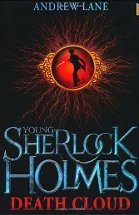Young Sherlock Holmes: Death Cloud by Andrew Lane

Macmillan Children's Books 2010.
(Ages 11+) If James Bond can have an adolescence celebrated in fiction,
then why can't Sherlock Holmes too? Andrew Lane, a lifelong Holmes fan
worked with the Conan Doyle Estate to create Death Cloud, the
first of
three novels that will star the young detective.
Lane hams it up to the heights of devilry and gothic horror with a
preposterous plot to kill British soldiers and so destroy the power of
the British Empire. It works because we already know that Sherlock
Holmes is larger than life and because the outlandish storyline is well
constructed and steeped in a lovingly researched and historically
accurate setting.
Lane really brings Victorian London to life with all its gruesome
sights and foul smells. At one point Sherlock is trying to escape the
ruffians chasing him through tunnels beneath the Thames, with hair
raising action and descriptions that made my skin crawl.
Baron Maupertuis is surely one of the most grotesque and outrageous
villains ever created and the fact that he escapes undefeated sets the
scene for Sherlock's next adventure, due later in the year.
Sherlock himself is a delightful melting pot of idealistic, arrogant
and heroic youth. At fourteen years old we are offered glimpses into
his future character as he first experiences the doubtful pleasures of
Laudanum. Also hinted at are the obsessive and addictive personality
streaks that become apparent in adulthood. Dr Watson is represented by
Matty Arnatt, a street urchin with whom Sherlock develops a close
friendship. With help from Sherlock's American tutor, his feisty
daughter and Matty, the quartet wreak havoc on the Baron's attempts to
bring down the British Empire.
My only complaint is that I doubt a Victorian girl (all be it an
American one) would refer to her Father and friends as 'You guys.'
However, it's a quibble really and I'm sure able readers of 11 plus
will enjoy this foray into the life of young Sherlock and will
hopefully seek out Conan Doyle's stories as a result.
Claire Larson